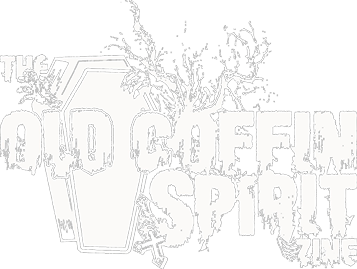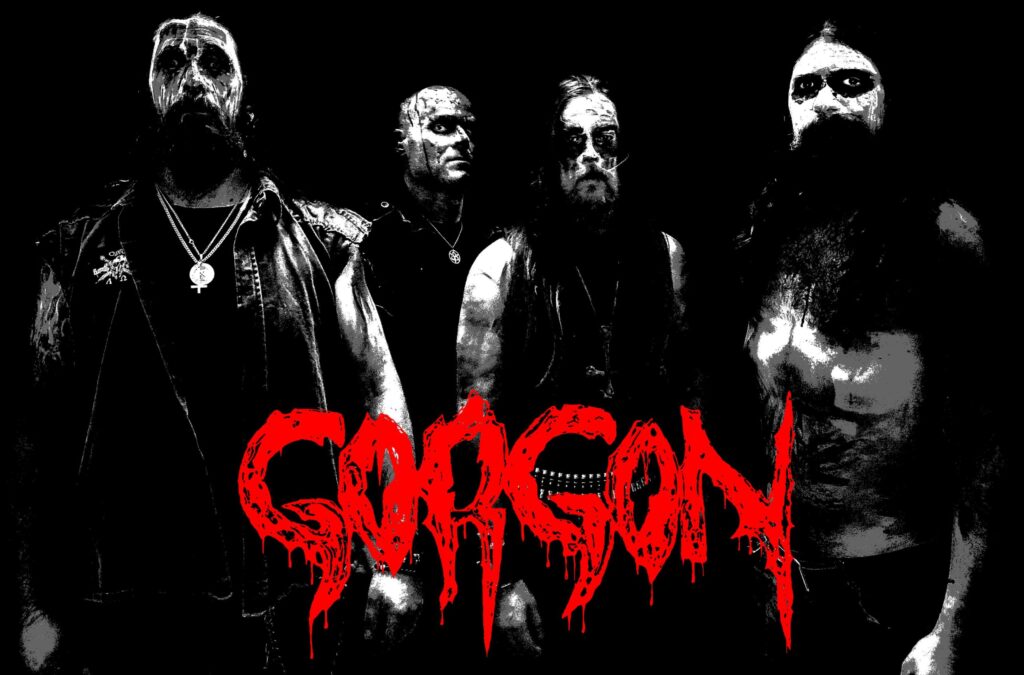
* Entrevista originalmente publicada no Maléfica Existência Zine # 5
Fomos bater um papo com o guitarrista/vocalista Chris, e único membro original da banda de Black Metal francesa Gorgon que existe no submundo desde 1991.
Saudações Chris! Em primeiro lugar, quero agradecer por entrar em contato comigo e por participar do The Old Coffin Spirit. Para começar, a banda Gorgon veio ao mundo em 1991. Por que vocês criaram uma banda de Black Metal? O que você pode nos dizer sobre os primeiros dias da banda ?
Chris: Saudações para você. Eu criei o grupo em 1991, porque ouvindo esse estilo de música, eu também queria tocar. Então fui procurar pessoas que pudessem me apoiar nesse projeto e encontrei uma baterista, Patricia, que tocava em uma banda chamada Witches (uma banda de Thrash Metal 100% feminina). Ela conhecia um baixista e depois que ela se juntou a nós, a primeira formação foi oficializada como um trio. Gravamos nossa demo única “Call From Unknown Depths” no ano seguinte, que inclui 4 títulos com introdução e outro. Lançado há 30 anos, foi remasterizado para uma reedição em CD em 2019. Na época eu estava ouvindo Venom, Bathory, Torture, Bulldozer, Celtic Frost, Sarcofago… Fizemos 2 shows com essa formação em 1992, então o baixista optou por deixar o grupo.
Em 1993, a banda lançou o seu primeiro EP “Immortal Hordes” como um quinteto. Você poderia apresentar a formação dessa época ? E como os Metalheads e mídia especializada receberam esse artefato, naquela época ?
Chris: Após o lançamento de nossa demo, uma gravadora italiana, Wounded Love Records, nos contatou para ser sua próxima contratação e para o lançamento de um EP. Um guitarrista que mais tarde formou o Necromantic. Esta formação durou apenas alguns meses, não mais. Mais um novo guitarrista se juntou a nós, que também permaneceu apenas alguns meses. Ele se juntou depois ao Samaël sob o pseudônimo de Kaos. Com os suíços gravou “Passage” e mais um ou dois discos. Fizemos alguns shows durante esse período com Samaël, então me vi sozinho após a saída dos outros 3 membros.
A banda nos primeiros anos sofreu com trocas de integrantes ? Em 1995 a banda chega ao seu Debut – Álbum : The Lady Rides a Black Horse. Mas nesse segundo lançamento já chegou como um quarteto. E eu achei espetacular esse Debut – CD. O que mudou nesse trabalho, trabalhando como quarteto ? Hoje você está contente com esse trabalho ou mudaria algo nele ?
Chris: De fato, a formação finalmente se estabilizou em 1994, mesmo que o processo criativo continuasse de lado. Um novo baterista, Sebastien se juntou ao grupo, assim como Brice na segunda guitarra e Joël no baixo. Com essa formação gravamos os 2 primeiros álbuns do grupo incluindo “The Lady…’ que você cita. Eu compus inteiramente este álbum, música e letras. Além disso, também cuidei do teclado e de todas as guitarras porque os takes de Brice não eram bons o suficiente para serem gravados. Ele só chegou pouco antes de entrarmos no estúdio e não tinha perspectiva suficiente sobre as músicas. Com mixagem e masterização, o álbum foi lançado em CD em 1995 Depois de todos esses anos, não vejo o que poderia ter mudado ou feito diferente e continuamos muito orgulhosos do resultado final. Extraímos músicas desta obra para o nosso set list, prova de que as suas faixas marcaram a história do grupo. É também o nosso álbum mais vendido até hoje. Foi lançado em formato cassete em uma gravadora da Malásia em 1997, uma versão em CD em uma gravadora inglesa saiu em 2010, depois uma versão em vinil pela gravadora mexicana Rex Bagude em 2017 e, finalmente, a Osmose Productions lançou uma versão remasterizada em 2019 em formato de CD e vinil com novas obras de arte. Além disso, entre as bandas que fizeram covers do nosso repertório, conheço pelo menos uma dessa é desse álbum. Quando se pensa em Gorgon, geralmente é esse álbum que é mencionado primeiro.
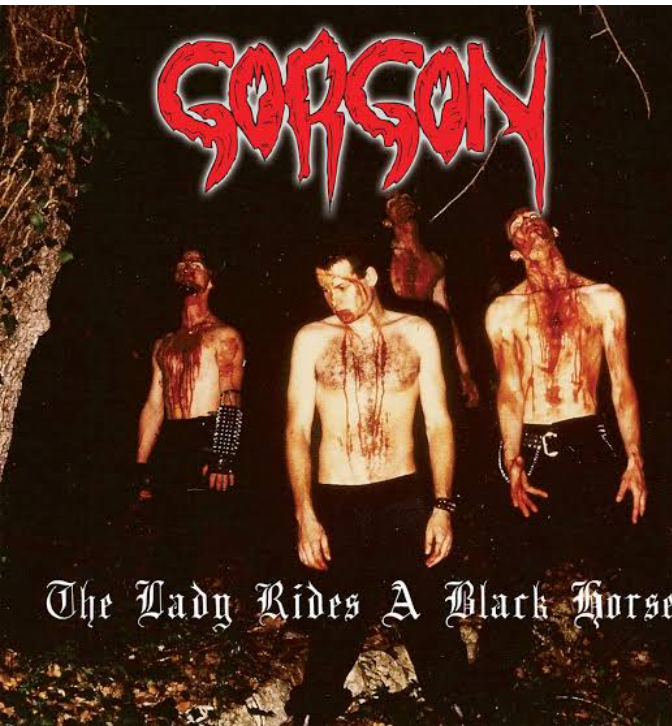
Chris, eu gostaria que você nos falasse um pouco mais dos trabalhos : Reign Of Obscenity de 1996 e The Jackal Pact de 1998. Ouvindo a discografia da banda é notável que a banda sempre evoluiu e não lançou um trabalho igual ao outro. Quais eram suas visões e o que representa esses dois últimos trabalhos de estúdio para o músico/Metalheads Chris hoje em dia ?
Chris: Ao contrário do primeiro álbum, o nosso segundo guitarrista, agora mais confiante e bem integrado, participou na composição destas duas obras. Onde “The Lady…” era mais centrado em uma guitarra, nessas 2 obras, as guitarras costumam fazer coisas diferentes. Há, portanto, mais riqueza e mais entrada melódica. Então nosso som mudou para incluir esse novo espectro sônico. Esta evolução deve-se também ao fato de não querermos repetir-nos e explorar ainda mais novos sons e ritmos. Voltar aos elementos do 1º álbum seria inútil, vejo isso como uma estagnação. Acrescentemos também que inegavelmente evoluímos tecnicamente em nossa maneira de abordar a composição. O trabalho foi mais pensativo, mesmo que essas músicas ainda saíssem de nossas entranhas. Mais uma vez, estamos tocando faixas desses 2 álbuns em shows em 2022, pois eles se encaixam perfeitamente com nossas músicas mais recentes. Isso mostra que esses títulos resistiram ao teste do tempo e ainda têm um forte impacto. Para mim, eles representam um passo lógico em nossa carreira. Para a banda ser o que é em 2022, esses álbuns precisavam ser feitos. Alguns detalhes poderiam ser alterados se fossem refeitos agora, mas no geral seriam bastante fiéis à sua versão original
Então, como você citou, está contente com toda a trajetória da banda até aqui. No início do novo século a banda lança o último trabalho “The Spectral Voices”.(2000) Com esse trabalho a banda fecha um ciclo de vitórias e aprendizado dentro do submundo metálico. Como foi gravar esse trabalho e por que a banda resolveu sair de cena ?
Chris: Uma nova formação gravou este álbum e, claro, os ensaios antes. As 11 faixas foram gravadas em um estúdio particular, mas ele não conseguiu completar nossa satisfação, então finalizamos tudo no mesmo estúdio do nosso álbum anterior. O baterista havia nos avisado que deixaria o grupo depois desse trabalho porque queria parar de tocar bateria. Além disso, a atmosfera era particular porque sabíamos que teríamos que procurar um substituto e uma sala de ensaio depois, já que tocávamos onde estava a bateria dele. Acabamos fazendo 4 ou 5 shows com essa formação, mas não é minha formação favorita porque o espírito não era mais o mesmo. Seguimos outros caminhos nesse álbum porque estávamos fartos do que acontecia na cena na época. Em retrospectiva, se tivesse que ser feito de novo, eu abordaria de forma diferente. Por outro lado, não me arrependo porque na época era assim que nos sentíamos, e fizemos o que achamos melhor para o grupo. O baterista que então assumiu, também não tinha o espírito que procurávamos. Então não o mantivemos por perto e houve uma queda na motivação. Passamos muito tempo ensinando a ele o set e trabalhando nele para finalmente ter que nos separar dele. Então, naturalmente, a banda entrou em hiato, não procuramos outro baterista depois. E os anos se passaram.
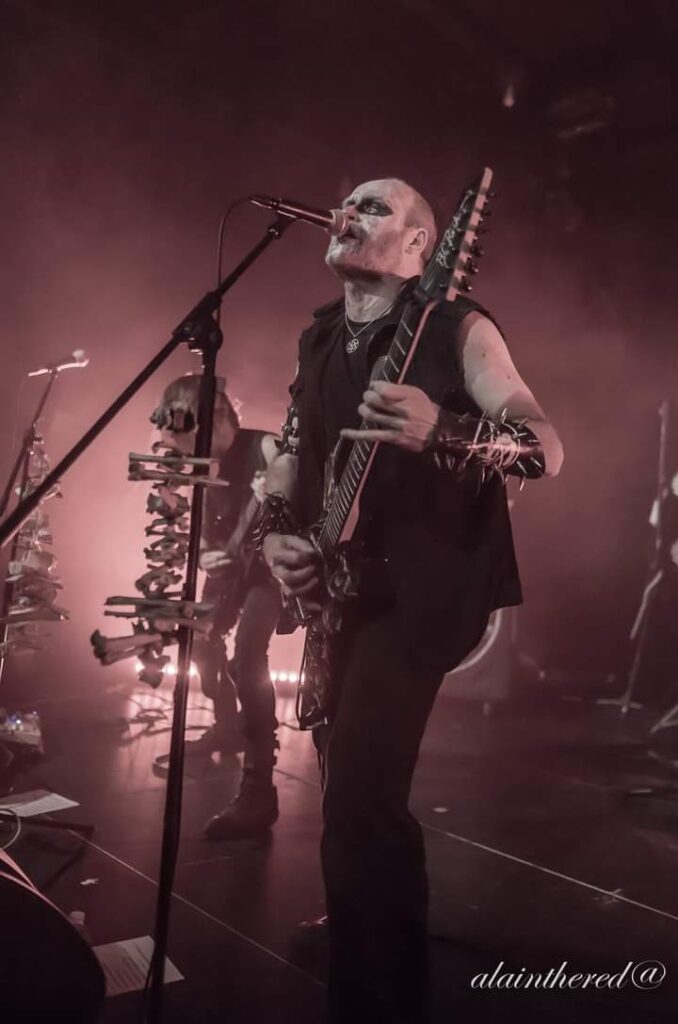
Neste tempo que a banda trancou – se numa tumba escura o nome do Gorgon continuou a colher frutos, já que neste período saiu duas coletâneas da banda e um split. O que você pode nos dizer sobre esses lançamentos ?
Chris: Sim, em 2000 uma compilação em cassete foi lançada em um pequeno selo francês. Intitulado “At The Memory Of The Past”,que cobre os nossos primeiros anos.. Posteriormente, em 2005, fui contatado pelo grupo OTAL para fazer um split CD com eles. O grupo estava em stand-by, eu não tinha nenhuma música nova escrita, então sugeri a ele que procurasse nossas faixas inéditas para fazer este CD. Em meus arquivos encontrei uma faixa inédita das sessões do nosso primeiro álbum, outra faixa dessas sessões que apareceu em outra versão do 3º álbum, uma mixagem diferente de outra faixa desse 3º álbum, uma faixa inédita gravada durante as sessões do 4º álbum, um cover do Burzum datado de 1994 e finalmente um título da nossa demo de 1992 nunca antes lançada em CD. Essa mistura construída ao longo de vários anos nos permitiu lançar quase tudo o que tínhamos guardado e nunca publicamos. Finalmente, por volta de 2010, a gravadora mexicana Rex Bagude Productions me procurou para uma compilação em CD do grupo destinada ao mercado sul-americano poderia ver a luz do dia. Gorgon ainda sem sinais de atividade, aceitei, e sob o título “Evoking The Ancient Forces Of Gorgon”, este CD foi lançado em 2011. Ele se baseia em nossos 4 primeiros álbuns com nossas faixas mais representativas, aquelas que tocamos ao vivo
Neste período que a banda ficou parada, o que você fez de sua vida ? Montou outro projeto ou só acompanhou a cena Underground de longe ?
Chris: Durante este período mudei-me várias vezes enquanto continuava a assistir a concertos de Metal. Afastei-me da cena underground por força das circunstâncias, quase não recebendo mensagens como antes. Continuei tocando guitarra para mim mesmo, mas sem tentar compor. Os anos voaram, até eu reviver a banda é que eu percebi quanto tempo havia se passado.
Aqui no Brasil, conhecemos pouca da cena francesa. Aliás, eu conheço poucas bandas. Mütilation, Hell Miilitia, Anorexia Nervosa e Mortífera, nos estilos mais extremos. E, é claro, a clássica banda de Heavy Metal Sortilége. O que você pode nos dizer da cena francesa e quais bandas e zines você indicaria para nossos maléficos leitores que tem o seu apoio ?
Chris: A maioria dos zines de papel aqui desapareceu em favor de alguns webzines, mas o problema para seus leitores é que eles são quase todos escritos em francês. O melhor para mim é L’antre des damnés (O Covil dos Condenados) especializado em BM. Há também o In Extremis que cobre Death metal, BM, Thrash ou mesmo Crypt Of Dr. Gore que é mais focado em Grind e Death metal. Se não houver nenhum problema de leitura, dado o idioma, esses são meus três principais. Em termos de música, temos muitos grupos aqui na França, mas sou muito seletivo nas minhas escolhas, gosto de poucas coisas. Temos muitos grupos que não trazem nada para a cena.. O nível técnico é bom mas não sinto nada ao ouvi-los. Entre os que se destacam para mim estão o Aryos que é bastante experimental, o Totale Angoisse que também não oferece BM genérico, ou o Excruciate 666 que entrega War Metal. Mercyless, com quem tocaremos em breve, também é um nome bem conhecido aqui no Death Metal, assim como os Benighted, que são ainda mais brutais musicalmente
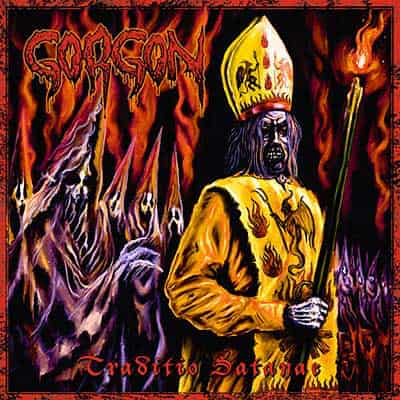
Chris, em nossas conversas você disse que trocou cartas com Sabaoth da Goatpenis e conheceu o pessoal da Mystifier. O que você conhece da cena brasileira e quais bandas tem o seu respeito do passado e conhece outras bandas atuais ?
Chris: Pouquíssimas bandas do seu país tiveram reconhecimento aqui. O Sepultura é o mais popular entre os grupos paralelos que saíram dele (Soulfly, Cavalera Conspiracy, Nailbomb). O Angra também teve uma recepção muito boa com o público francês. No mesmo nível podemos adicionar Sarcofago e Krisium. Por outro lado, Ratos de Porão, Goatpenis, Nervosa, Holocausto ou Mystifier são mais conhecidos apenas por insiders e é isso. Como você pode ver, há pouca exposição para grupos brasileiros. Sei por experiência que existem necessariamente outros grupos de valor, e que também está ligado aos gostos de cada um. Outro francês certamente lhe teria dado outros nomes na pergunta anterior, assim como outros grupos do seu país poderiam se destacar aqui, se tivessem uma boa promoção.
Voltando a falar da Gorgon…A banda ficou 19 anos fora dos palcos, estúdio e da cena Underground. Porém, em 2019, a banda voltou e lançou um novo trabalho, “The Veil of Darkness” e somente com um membro você, Chris. Porque tu optou por trabalhar sozinho ? Eu sei que a banda faz bastante shows pela França e Europa. Você contrato músicos para apresentações ao vivo e pretende continuar como uma “One Man Band” pelos menos em estúdio ?
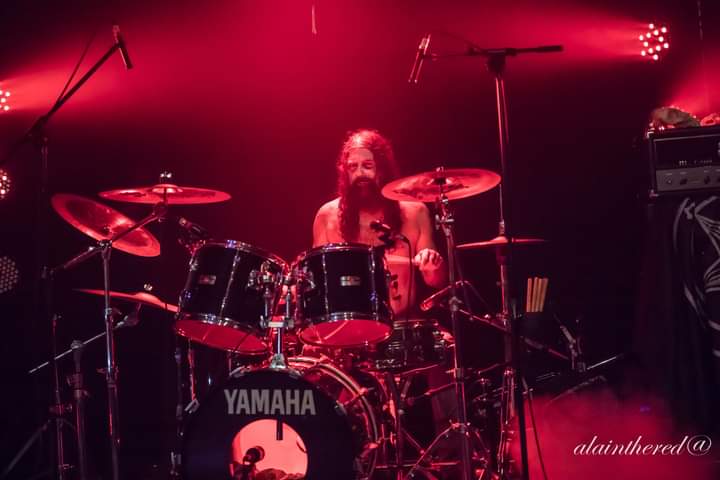
Chris: Quando decidi reativar a banda em dezembro de 2017, entrei em contato com o baterista dos 3 primeiros álbuns, que não me respondeu, e o baixista do 3º e 4º. Este último, muito ocupado, e tendo parado o instrumento, não quis voltar a mergulhar nessa empreitada. Sabendo que o baterista do 4º álbum também já não tocava bateria, optei então por recorrer a um baterista de sessão. Quando se tratava de voz e violão, eu podia lidar com tudo. Então o baixo ficou e eu tinha um emprestado para mim, no qual trabalhei, e então fomos 2 que entramos no estúdio em junho de 2018. O baterista fez todos os takes em um dia, depois eu assumi. Quando o álbum foi lançado em janeiro de 2019, me pediram para fazer shows. Eu estava indeciso em voltar aos palcos, porque sem os músicos certos, eu não queria dar shows que pra mim iriam manchar o show e reputação da banda. Então, foi mais tarde que comecei a procurar um line-up ao vivo. Muitas vezes eu via Ozrib (ex-Odium) em shows locais onde eu ia. Conhecendo-o desde o final dos anos 90, ofereci-lhe o cargo de baixista que ele aceitou, sugerindo-me Hellesylt que era o ex-baterista do Odium. Sabendo que já tocavam juntos há vários anos, validei essa escolha e foi como trio que começamos os ensaios. Mathias, que toca a 2ª guitarra, chegou em setembro de 2019, e em outubro essa nova formação estava se apresentando em um festival. Até hoje, ainda são as mesmas pessoas que você encontra ao meu lado. Quando chegou a hora de lançar um sucessor para o nosso 5º álbum, o baixista me disse que, como não gostava do estúdio, se eu pudesse fazer o baixo sozinho, seria bom para ele. Falei sobre isso com o gerente responsável pelo estúdio escolhido e contratado no início de 2020, que me respondeu que o baterista da fórmula, e eu para todo o resto, havíamos trabalhado para “The Veil Of Darkness”, então poderíamos muito bem recomeçar. Então fomos em frente com isso em mente, com Hellesylt na bateria, porque fazendo todas as guitarras sozinho, economizaríamos tempo no estúdio. Depois de muitos ensaios entramos em estúdio no dia 1º de outubro de 2020 para começar a ajustar o som da bateria. No dia 2, uma tempestade atingiu nossa região, deixando as estradas intransitáveis por várias semanas para o baterista que havia voltado para casa e que morava longe do estúdio. No dia 3, tendo conseguido contatá-lo por telefone conectado a um gerador, ele me disse que era impossível para ele vir e que aceitou que eu procurasse um baterista de sessão para fazer os takes no horário alocado pelo estúdio . Encontrado durante o dia, um baterista veio na manhã do dia 4, e na noite do dia 5 todos os seus takes estavam na lata sem saber de antemão a menor nota dos 11 títulos a serem gravados. Uma vez na fita, continuei com o que restava a ser feito. Que conclusão tirar de tudo isso? Se um novo álbum está no horizonte, é novamente como uma dupla, Hellesylt e eu, que vejo isso se desenrolar. Um baterista e eu é uma fórmula comprovada, então acho que vamos seguir esse caminho novamente. Há maior eficiência, maior desempenho porque gravo com bastante rapidez e a fase de “decisão”, diante de um problema que se pode encontrar, é mais rápida de ser tomada.
Em 2021, você lançou um grandioso trabalho e que eu gostei muito. Como está sendo a resposta dos Blackmetallers mundo afora e mídia especializada para “Traditio Satanae” ?
Chris: Este álbum foi realmente muito bem visto por Metalheads, assim como por zines, webzines e rádios. Ajudou a divulgar ainda mais o nome da banda e a manter a chama acesa no coração de quem nos acompanha há muito tempo. Também fizemos muito mais shows, o que permitiu que alguns que só nos conheciam pelo nome pudessem nos julgar ao vivo, e muitas vezes nos apoiar depois comprando um álbum ou uma camiseta. Popularidade não é o objetivo, mas na minha opinião com este álbum, nos ancoramos um pouco mais no coração de muitas pessoas.
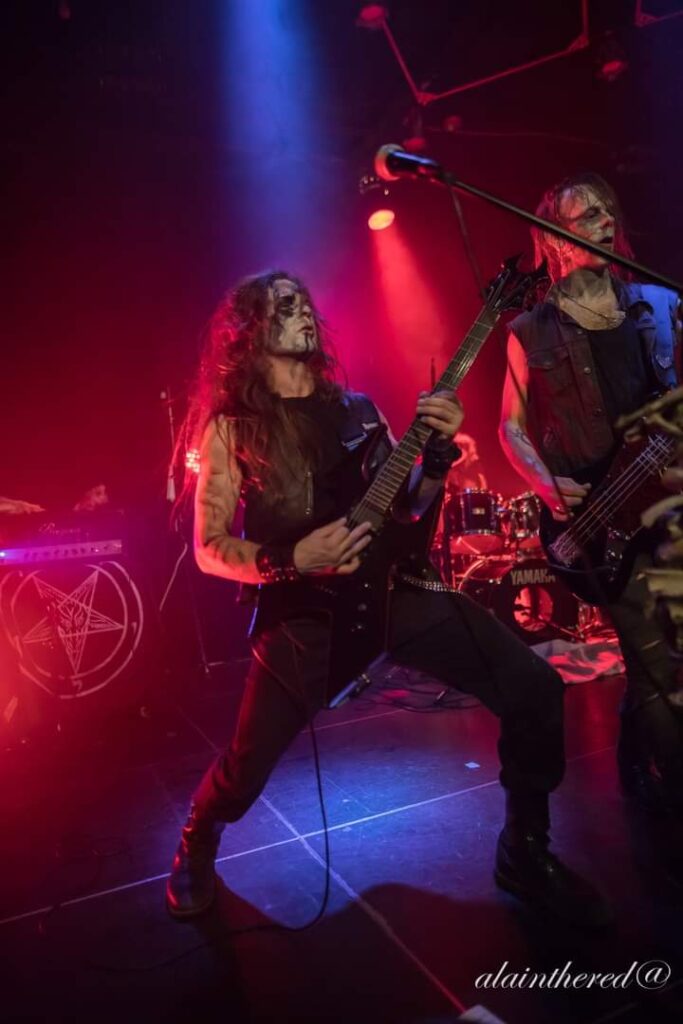
Aliás, essa capa é muito poderosa. Quem criou essa arte e como é estar numa gravadora mundialmente conhecida como a Osmose nos dias atuais ?
Chris: Nós realmente tivemos dificuldade em encontrar o artista certo para fazer a capa que tínhamos em mente. Ele é o 4º ou 5º cara que tentamos, então, como você pode imaginar, nos fez perder tempo e principalmente esperança. Pensávamos que não conseguiríamos a pessoa certa para conseguir o que queríamos. E então, depois de entrar em contato com Alex Shadrin do Nether Temple Design, tudo correu bem e ele chegou ao resultado que conhecemos. Ele procedeu em etapas que ele nos enviou, e que validamos a cada vez e ele fez um trabalho muito bom. As cores são bastante inusitadas para o BM, o que destaca o visual e como não gostamos de acompanhar o que está sendo feito, mas sim de fazer o nosso caminho, está perfeito. Ele então fez um molde para uma de nossas camisetas, porque é claro que mantivemos contato. As relações com nossa gravadora são boas porque eles nos conhecem desde 1992, quando já estavam distribuindo nossa demo. Eles, como nós, foram criados em 1991 e, ao longo dos anos, distribuíram cada uma de nossas produções em seu catálogo. Além da facilidade de linguagem, são muito receptivos quando tenho alguma dúvida. Em novembro de 2021, durante um festival onde estávamos nos apresentando, conheci o dono pela primeira vez apesar de todos esses anos nos conhecermos apenas “virtualmente”. Acompanhado pelo designer gráfico da gravadora, pude ver com quem havia dialogado durante o desenvolvimento de todas as capas que fizemos juntos. Anteriormente, eu só conhecia o filho do dono, que também trabalha na gravadora, e isso foi durante outro festival, em dezembro de 2019. De fato, a reputação da gravadora está bem estabelecida e era disso que precisávamos porque é um pilar do underground dados os seus anos de existência. Temos total liberdade artística e eles nos apoiam como deveriam.
Chris, você como um Metalheads das antigas escuta muito metal mais old school. Eu ouvindo a discografia da banda vejo dentro da Gênesis da banda muita influências de Thrash & Speed Metal desde o início da banda. Claro, dentro da proposta Black Metal poderoso da banda. Essa influência sempre esteve ali. Mas no Traditio Satanae, essas influências estão mais na cara e que essa pegada “mais speed” deixou esse trabalho matador ! Quais são suas influências como músico ?
Chris: No final dos anos 80, início dos anos 90 eu ouvia Venom, W.A.S.P., Sodom, Bulldozer, Torture, Celtic Frost, Sarcofago, Bathory e Death SS. Eu nunca me senti atraído por bandas ultra populares como Megadeth, Slayer ou Pantera, embora eu tenha visto eles em shows. Nos primeiros anos da banda, foram Samael, Impaled Nazarene e o BM em geral que assumiram o comando. Além disso, todas essas raízes, relativamente extremas, especialmente colocadas em seu contexto, me impulsionaram a compor essa música enérgica que reivindico. Isso não foi feito à custa da melodia e de uma certa pesquisa para não se repetir. Além disso, onde muitas bandas privilegiam o aspecto “velocidade”, nunca hesitamos em diminuir o ritmo ou colocar padrões mid-tempo para variar as atmosferas em nossas gravações. Este ainda é o caso de “Traditio Satanae”, mesmo que pareça mais brutal, mais selvagem, do que nossos trabalhos anteriores. Seguindo uma diretriz, digamos “na sua cara”, salpicamos alguns títulos com partes mais calmas, justamente para nos possibilitar então apoiar e fazer contrastes no que propomos ao ouvinte.
Gostaria de saber de você… Se você tivesse que escolher para ouvir até os seus últimos dias neste plano somente Black Metal e você tinha que escolher entre a cena da Noruega, da Grécia, ou da cena brasileira qual você escolheria e por que ?
Chris: Como vocês entenderam, conheço pouco da cena brasileira, então mesmo que isso me permitisse descobri-la, na dúvida, não é a que vou escolher. Acho que a cena norueguesa é superestimada. Tem bons representantes, mas como em todo lugar, também tem alguns não tão bons. A minha escolha será, portanto, a cena grega, porque me parece ser representada por grupos com uma abordagem mais pessoal. Às vezes falta a loucura e o poder no som, mas também é muito vasto, e muitas vezes mais melódico. Você teria me dado rédea solta, eu teria escolhido a cena finlandesa que muitas vezes combina o bom som, o gancho melódico e a loucura que eu gosto de ver entrelaçados.
Meu caro amigo, chegamos ao final dessa entrevista. O espaço é seu e deixe suas considerações finais ao Metalheads do Brasil & América do Sul.
Chris: Desde o nosso retorno, tenho visto um apoio real vindo de muitos países da América do Sul e do Brasil em particular, para conosco. De longe, tenho a impressão de que você manteve esse espírito underground que na Europa foi suplantado pelo Metal mais “mainstream”. O acesso ao Metal, no sentido amplo da palavra, por aqui não nos trouxe fãs, mas sim pessoas que o ouvem como bens de consumo. Tanto as condições de vida quanto as mentalidades têm algo a ver com isso, mas o que quero dizer é que é reconfortante ver fortalezas como seu país, Peru e até México, ainda ter tantos devotos puros. Além disso, gostaria de convidar aqueles que ainda não nos conhecem, a ouvir o que temos a oferecer para ver se aderem à nossa abordagem musical. Conforme detalhado em suas várias perguntas, há uma escolha entre nossos álbuns, e um pode ser uma preferência sobre o outro. É por isso que eu recomendaria o nosso mais recente, para julgar o que o grupo vale atualmente. Sempre haverá tempo para mergulhar em nosso passado para avaliar nossa evolução. Até lá, agradeço em nome da Gorgon, o apoio que virá do tempo que nos dedicou.
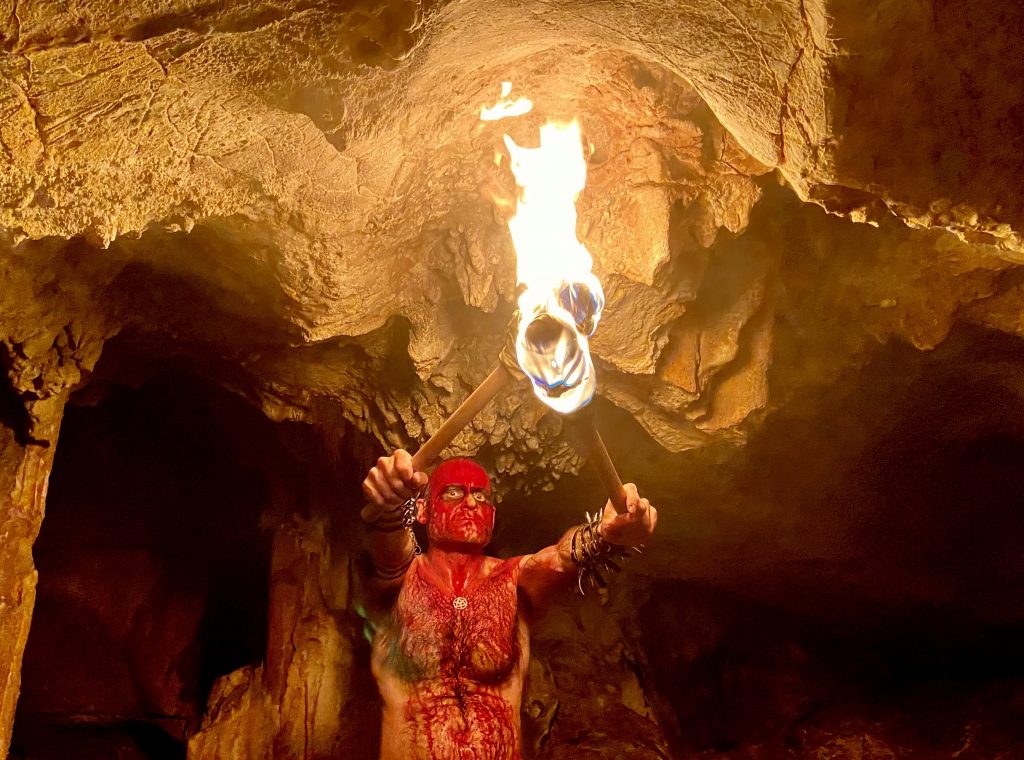
ENGLISH VERSION:
We chatted with Chris guitarist, vocalist and only original member of the French Black Metal band Gorgon that has been in the underworld since 1991
Greetings Chris! First of all, I want to thank you for contacting me and for participating in the Maleficent Existence Zine. For starters, the band Gorgon came into the world in 1991. Why did you create a Black Metal band? What can you tell us about the band’s early days?
Cris: Greetings to you. I created the group in 1991, because listening to this style of music, I also wanted to play it. So I went looking for people who could support me in this project and I found a drummer, Patricia, who used to play in a band called Witches (a 100% female Thrash Metal band). She knew a bass player and after she joined us, the first line-up was made official as a trio. We recorded our unique demo “Call From Unknown Depths” the following year which includes 4 titles with intro and outro. Released 30 years ago, it has been remastered for a CD reissue in 2019. At the time I was listening to Venom, Bathory, Torture, Bulldozer, Celtic Frost, Sarcofago… We did 2 concerts with this line-up in 1992, then the bassist chose to leave the group.
In 1993, the band released their first EP “Immortal Hordes” as a quintet. Could you present the formation of that time? And how did Metalheads and specialized media receive this artifact at that time?
Cris: Following the release of our demo, an Italian label, Wounded Love Records, contacted us to be their next signing for the release of an E.P.. So we accepted and entered the studio in July 1993. The line-up then included a new bassist and a guitarist who later formed Necromantic. This formation only lasted a few months, no more. Yet another new guitarist has joined us, who also will remain only a few months. He will join thereafter Samaël under the pseudonym of Kaos. With the Swiss he recorded “Passage” and one or two other albums. We did a few concerts during this period with Samaël, then I found myself on my own following the departure of the 3 other members.
The band in the first years suffered with changes of members? In 1995 the band reaches its Debut – Album: The Lady Rides a Black Horse. But this second release has already arrived as a quartet. And I thought this Debut – CD was spectacular. What has changed in this work, working as a quartet? Are you happy with this job today or would you change something about it?
Cris: Indeed the formation finally stabilized in 1994, even if the creative process continued on the side. A new drummer, Sebastien joined the group, as well as Brice on 2nd guitar and Joël on bass. With this line-up we recorded the first 2 albums of the group including “The Lady…’ that you quote. I entirely composed this album, music and lyrics. Besides, I also took care of the keyboard and all the guitars because Brice’s takes weren’t good enough to be kept. He only arrived shortly before we entered the studio and didn’t have enough perspective on the songs. With mixing and mastering, the album was released on CD in 1995 After all these years, I don’t see what I could’ve changed or done differently and we remain very proud of the end result. We draw from this opus for our set list, proof that its titles have marked the history of the group. It’s also our best-selling album to date. It was released in cassette format on a Malaysian label in 1997, a CD version on an English label came out in 2010, then a vinyl version on the Mexican label Rex Bagude in 2017, and finally, Osmose Productions released it in a remastered version in 2019 both in CD and vinyl format featuring brand new artwork. Moreover, among the bands that have done covers of our repertoire, I know of at least one from this album. When one thinks of Gorgon, it’s generally this album that is mentioned first.
Chris, I would like you to tell us a little more about your works: Reign Of Obscenity from 1996 and The Jackal Pact from 1998. Listening to the band’s discography, it is remarkable that the band has always evolved and has not released a work equal to the previous one. What were your visions and what do these last two studio works represent for musician/Metalheads, Chris today?
Cris: Unlike the first album, our second guitarist, now more confident and well integrated, participated in the composition of these two works. Where “The Lady……” was more centered on one guitar, on these 2 opuses, the guitars often do different things. There is therefore more richness and more melodic input. So our sound has changed to include this new sonic spectrum. This evolution is also due to the fact of not wanting to repeat ourselves and to further explore new sounds and rhythms. Going back to the elements of the 1st album would’ve been useless, I see it as stagnation. Let’s also add that we’ve undeniably progressed technically in our way of approaching composition. The work was more thoughtful, even if these songs still came out of our guts. Once again, we are playing excerpts from these 2 albums in concerts in 2022, beacause they fit perfectly with our newer songs. This goes to show that these titles have stood the test of time and still have a strong impact. For me, they represent a logical step in our career. For the band to be what it is in 2022, these albums needed to be made. Some of the details might be changed if they were redone now, but overall, they would be quite faithful to their original version.
So, as you mentioned, you are happy with the whole trajectory of the band so far. At the beginning of the new century the band released the last work “The Spectral Voices”.(2000) With this work the band closes a cycle of victories and learning within the metallic underworld. How was recording this work and why did the band decide to leave the scene?
Cris: A new line-up recorded this album and of course the rehearsals beforehand. The 11 tracks were canned at a private home-studio, but he wasn’t able to complete our collaboration, so we finalized everything at the same studio as our previous album. The drummer had warned us that he would leave the group following this work because he wanted to stop the drums. In addition, the atmosphere was particular because we knew that we would have to look for a replacement and a practice room afterwards, since we played where his drums were. We ended up playing 4 or 5 concerts with this line-up but it’s not my favorite line-up because the spirit was no longer the same. We followed other paths on this album because we were fed up with what was happening in the scene at the time. In hindsight, if it had to be done again, I would approach it differently. On the other hand, I don’t regret it because at the time, that’s how we felt, and we did what we thought was best for the group. The drummer who then took over, didn’t have the spirit we were looking for either. So we didn’t keep him around and there was a drop in motivation. We had spent a lot of time teaching him the set and working on it with him to finally have to part ways with him. So naturally, the band was put on hiatus, we didn’t look for another drummer afterwards. And the years have passed.
In this time that the band locked itself in a dark tomb, the name of Gorgon continued to reap fruits, since in this period two compilations of the band and a split came out. What can you tell us about these releases?
Cris: Yes, in 2000 a cassette compilation was released on a small French label. Named “At The Memory Of The Past”, it covers our early years. Subsequently, in 2005, I was contacted by the group OTAL to make a split CD with them. The group was on stand-by, I didn’t have any new songs written, so I suggested to him to dig into our unreleased tracks to make this CD. In my archives I found an unreleased track from the sessions of our first album, another track from these sessions which appeared in another version on the 3rd album, a different mix of another track from this 3rd album, an unreleased track recorded during the sessions of the 4th album, a cover of Burzum dating from 1994 and finally a title of our demo of 1992 never before released on CD. This mix built up over a period of several years allowed us to propose almost everything that we had kept and never published. Finally, around 2010, the Mexican label Rex Bagude Productions asked me if a CD compilation of the group intended for the South American market could see the light of day. Gorgon still showing no signs of activity, I accepted, and under the title “Evoking The Ancient Forces Of Gorgon”, this CD was released in 2011. It draws from our first 4 albums with our most representative tracks, those we played live.
In this period that the band was stopped, what did you do with your life? Did you set up another project or just followed the Underground scene from afar?
Cris: During this period I moved several times while continuing to attend Metal concerts. I moved away from the underground scene by force of circumstances, hardly receiving any messages as I did before. I continued to play the guitar for myself but without trying to compose. The years flew by, it wasn’t until I revived the band that I realized how much time had passed.
Here in Brazil, we know little about the French scene. In fact, I know very few bands. Mütilation, Hell Miilitia, Anorexia Nervosa and Deadly, in the most extreme styles. And, of course, the classic Heavy Metal band Sortilége. What can you tell us about the French scene and which bands and zines would you recommend to our malevolent readers who have your support?
Cris: Most of the paper zines here have disappeared in favor of a few webzines, but the problem for your readers is that they are almost all written in French. The best one is for me L’antre des damnés (The Den of the Damned) specialized in BM. There is also In Extremis which covers Death metal, BM, Thrash or even Crypt Of Dr. Gore which is more focused on Grind and Death metal. If there is no problem reading given the language, then these are my top three. In terms of music, we have a lot of groups here in France, but I’m very selective in my choices, I like very few things. We have a lot of groups that don’t bring anything to the table. It’s well done, the technical level is good but I don’t feel anything when listening to them. Among those that stand out for me are Aryos which is quite experimental, Totale Angoisse which also doesn’t offer generic BM either, or Excruciate 666 which delivers War Metal. Mercyless, with whom we will playing shortly, is also a well-known name here in Death Metal, just like Benighted, who are even more brutal musically.
Chris, in our conversations you said that you exchanged letters with Sabaoth from Goatpenis and met the people at Mystifier. What do you know about the Brazilian scene and which bands have your respect from the past and do you know other current bands?
Cris: Very few bands from your country have had recognition here. Sepultura is the most popular with the side groups that have come out of it (Soulfly, Cavalera Conspiracy, Nailbomb). Angra had also had a very good reception with the French public. At the same level we can then add Sarcofago and Krisium. On the other hand, Ratos de Porào, Goatpenis, Nervosa, Holocausto or Mystifier are better known only to insiders and that’s about it. As you can see, there is little exposure for Brazilian groups. I know from experience that there are necessarily other groups of value, and that it is also linked to the tastes of each and everyone. Another Frenchman would surely have given you other names in the previous question, just as other groups from your country could make a name for themselves here, if they had good promotion.
Going back to the Gorgon… The band spent 19 years out of the stage, studio and underground scene. However, in 2019, the band came back and released a new work, “The Veil of Darkness” and only with one member you, Chris. Why did you choose to work alone? I know the band does a lot of shows in France and Europe. Do you hire musicians for live performances and intend to continue as a “One Man Band” at least in the studio?
Cris: When I decided to reactivate the band in December 2017, I contacted the drummer of the first 3 albums, who did not answer me, and the bassist of the 3rd and 4th. The latter, too busy, and having stopped the instrument, didn’t wish to dive back into this venture. Knowing that the drummer of the 4th album no longer played drums either, I then chose to turn to a session drummer. When it came to voice and guitar, I could handle it all. So the bass remained and I had one lent to me, which I worked on, and it was therefore 2 of us that entered the studio in June 2018. The drummer did all his takes in one day, then I took over. When the album was released in January 2019, I was asked to do concerts. I was undecided about getting back on stage, because without the right musicians, I didn’t want to give shows that for me would tarnish the live reputation of the band. So it was later on that I started looking for a live line-up. I often saw Ozrib (ex-Odium) at local concerts where I went. Knowing him since the end of the 90s, I offered him the position of bass player which he accepted, suggesting me Hellesylt who was the former drummer of Odium. Knowing that they had already played together for several years, I validated this choice and it was as a trio that we started rehearsals. Mathias, who plays the 2nd guitar, arrived in September 2019, and in October this new line-up was performing at a fest. To this day, it’s still the same guys you find at my side. When it came time to canned a successor to our 5th album, the bassist told me that since he didn’t like the studio, if I could do the bass by myself it would suit him. I spoke about it to the manager in charge of the studio chosen and booked at the beginning of 2020, who answered me that the formula drummer, and me for everything else, had worked for “The Veil Of Darkness”, so we might as well start over. So we went ahead with this in mind, with Hellesylt on drums, because by doing all the guitars myself we would save time in the studio. After many rehearsals we entered the studio on October 1, 2020 to begin adjusting the sound of the drums. On the 2nd, a weather storm hit our region, making the roads impassable for several weeks for the drummer who had returned home and who lived far from the studio. On the 3rd, having managed to reach him by telephone connected to a generator, he told me that it was impossible for him to come and that he accepted that I look for a session drummer to do the takes in the time slot allocated by the studio. Found during the day, a drummer came on the morning of the 4th, and on the evening of the 5th all his takes were in the can without knowing beforehand the slightest note of the 11 titles to be recorded. Once on tape, I moved on with what remained to be done. What conclusion to draw from all this? If a new album is on the horizon, then it is again as a duo, Hellesylt and me, that I see this unfolding. A drummer and me is a proven formula so I think we will go that route again. There is greater efficiency, greater performance because I record quickly enough and the “decision” phase, when faced with a problem that one may encounter, is faster to take.
In 2021, you released a great work and I really liked it. How is the response of the Blackmetallers world now and the specialized media to “Traditio Satanae” ?
Cris: This album was really very well perceived by simple amateurs as well as zines, webzines and radios. It helped spread the band’s name even further, and keep the flame burning in the hearts of those who have been following us for a long time. We also performed a lot more concerts, which allowed some who only knew us by name to be able to judge us live, and often to support us afterwards by buying an album or t-shirt. Popularity is not the goal, but in my opinion with this album, we anchored ourselves a little more in the hearts of many people.
By the way, this cover is very powerful. Who created this art and how it is is in a world-renowned label like Osmose nowadays ?
Cris: We really had a hard time finding the right artist to do the cover we had in mind. He’s the 4th or 5th guy we’ve tried, so as you can imagine, it made us waste time and especially hope. We thought that we wouldn’t be able to get the right person to achieve what we wanted. And then, after contacting Alex Shadrin of Nether Temple Design, everything went smoothly and he came up with the result we know. He proceeded in stages that he sent to us, and that we validated each time and he did a really good job. The colors are quite unusual for BM, which brings out the visual and as we don’t like to follow what is being done, but rather to make our way, that’s perfect. He then made a pattern for one of our t-shirts, because of course we stayed in touch. Relations with our label are good because they have known us since 1992, when they were already distributing our demo. They, like us, were created in 1991 and over the years, they have distributed each of our productions on their catalog. In addition to the ease of language, they are very responsive when I have any questions. In November 2021, during a fest where we were performing, I met the owner for the very first time despite all these years we only knew each other “virtually”. Accompanied by the label’s graphic designer, I was able to see with whom I had dialogued during the development of all the covers that we made together. Previously, I only met the owner’s son, who also works at the label, and this was during another fest, in December 2019. Indeed, the reputation of the label is well established and that’s what we needed because it is a pillar of the underground given its years of existence. We have total artistic freedom and they support us as it should.
Chris, you as an old school Metalheads listen to a lot of old school metal. Listening to the band’s discography, I see within the band’s Genesis a lot of Thrash & Speed Metal influences since the beginning of the band. Of course, within the band’s powerful Black Metal proposal. That influence was always there. But in Traditio Satanae, these influences are more in the face and that “more speed” footprint left this work killer! What are your influences as a musician
Cris: In the late 80s, early 90s I was listening to Venom, W.A.S.P., Sodom, Bulldozer, Torture, Celtic Frost, Sarcofago, Bathory and Death SS. I’ve never been attracted to ultra popular bands like Megadeth, Slayer or Pantera, even though I’ve seen them in concert. In the first years of the band, it was Samael, Impaled Nazarene and the BM in general that took over. Also, all these roots, relatively extreme, especially put in their context, pushed me to compose this energetic music that I claim. This wasn’t done at the expense of the melody and a certain research not to repeat oneself. Moreover, where many bands favor the “speed” aspect, we’ve never hesitated to slow down the rhythm or put mid-tempo patterns to vary the atmospheres on our recordings. This is still the case on “Traditio Satanae” even if it may appear more brutal, wilder, than our previous works. While following a guideline, let’s say “in your face”, we’ve sprinkled some titles with calmer parts, precisely to enable us then to support and make contrasts in what we propose to the listener.
I would like to hear from you… If you had to choose to listen until your last days in this plan only Black Metal and you had to choose between the Norwegian scene, the Greek scene or the Brazilian scene which would you choose and why?
Cris: As you’ve understood, I know little about the Brazilian scene, so even if it would allow me to discover it, in doubt, it’s not the one I’ll choose. I think the Norwegian scene is overrated. It has good representatives, but like everywhere, there’s also some not so good ones. My choice will therefore be the Greek scene, because it seems to me to be represented by groups with a more personal approach. It sometimes lacks the madness and the power in the sound, but it’s also very vast too, and often more melodic. You would’ve given me free rein, I would’ve chosen the Finnish scene which often combines the good sound, the melodic hook and the madness that I like to see intertwined together.
My dear friend, we have reached the end of this interview. The space is yours and leave your final thoughts to Metalheads from Brazil & South America…
Cris: Since our return, I’ve seen real support coming from many countries in South America and Brazil in particular, towards us. From a distance, I have the impression that you’ve retained this underground spirit which in Europe has been supplanted by more “mainstream” Metal. Access to Metal, in the broad sense of the word, around here hasn’t brought us fans, but rather people who listen to it as consumer goods. Both living conditions and mentalities have something to do with it, but what I’m getting at is that it’s comforting to see strongholds such as your country, Peru and even Mexico, still have so many pure devotees. Also, I would like to invite those who do not know us yet, to listen to what we have to offer to see if they adhere to our musical approach. As itemized in your various questions, there’s a choice among our albums, and one may be a preference over the other. This is why I would recommend our latest, to judge what the group is currently worth. There will always be time to delve into our past to assess our evolution. Until then, I thank you on Gorgon’s behalf, for the support that will come from the time you have devoted to us.
